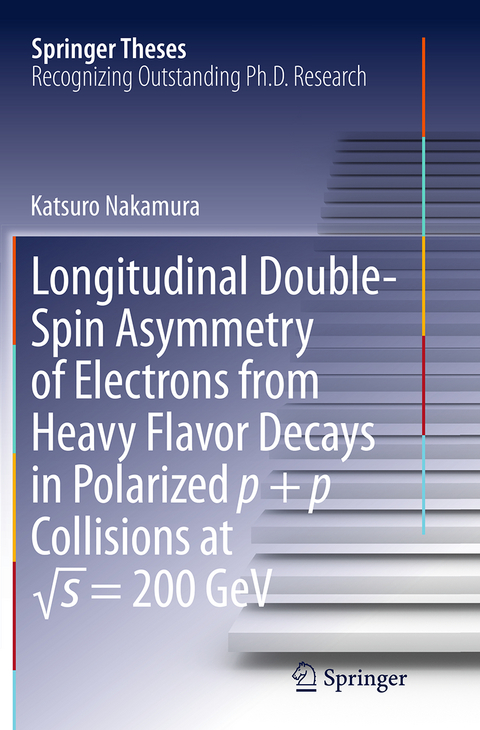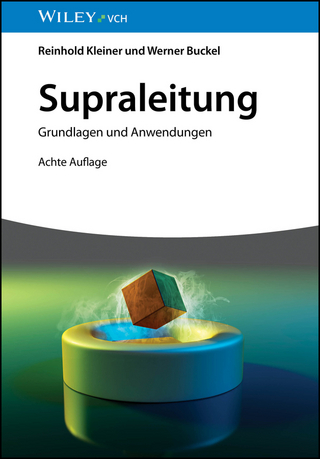
Longitudinal Double-Spin Asymmetry of Electrons from Heavy Flavor Decays in Polarized p + p Collisions at √s = 200 GeV
Seiten
2016
|
Softcover reprint of the original 1st ed. 2014
Springer Verlag, Japan
978-4-431-56368-6 (ISBN)
Springer Verlag, Japan
978-4-431-56368-6 (ISBN)
This outstanding contribution to the science of particle physics presents ground-breaking results from Japanese researchers with the PHENIX experiment, identifying for the first time the constraint of the gluon polarization in the small Bjorken x region.
In this thesis, the measurement of double-spin asymmetry for electron production from heavy flavor decays was performed in a Relativistic Heavy Ion Collider (RHIC) in the PHENIX experiment at Brookhaven National Laboratory to measure the polarized parton distribution function of gluon in the small Bjorken x region (x~0.01).
For this experiment, for the first time a Hadron Blind Detector (HBD), which is a position-sensitive gas Cherenkov counter with Gas Electron Multiplier whose surface is evaporated by CsI, was employed. This HBD contributes to reducing the background from electron pairs produced by real and virtual photon conversion. Furthermore, the author develops a new analysis method for the background reduction, and the signal-to-background ratio is improved by a factor of roughly 2.0. Using the combination of the HBD and a new analysis method, the double-spin asymmetry of the electron production with transverse momentum ranging 0.5 < pT < 3.0 GeV/c is measured and confirmed to be zero-consistent within the limit of the statistical uncertainty of about 1%. This result identifies the constraint of the gluon polarization in the small Bjorken x region, a worldwide first.
In this thesis, the measurement of double-spin asymmetry for electron production from heavy flavor decays was performed in a Relativistic Heavy Ion Collider (RHIC) in the PHENIX experiment at Brookhaven National Laboratory to measure the polarized parton distribution function of gluon in the small Bjorken x region (x~0.01).
For this experiment, for the first time a Hadron Blind Detector (HBD), which is a position-sensitive gas Cherenkov counter with Gas Electron Multiplier whose surface is evaporated by CsI, was employed. This HBD contributes to reducing the background from electron pairs produced by real and virtual photon conversion. Furthermore, the author develops a new analysis method for the background reduction, and the signal-to-background ratio is improved by a factor of roughly 2.0. Using the combination of the HBD and a new analysis method, the double-spin asymmetry of the electron production with transverse momentum ranging 0.5 < pT < 3.0 GeV/c is measured and confirmed to be zero-consistent within the limit of the statistical uncertainty of about 1%. This result identifies the constraint of the gluon polarization in the small Bjorken x region, a worldwide first.
Dr. Katsuro Nakamura Kyoto University
Nucleon Spin Physics.- Experimental Setup.- Electron Analysis.- Results.- Discussion.- Conclusion.
| Erscheinungsdatum | 03.10.2016 |
|---|---|
| Reihe/Serie | Springer Theses |
| Zusatzinfo | 31 Illustrations, color; 63 Illustrations, black and white; XVI, 141 p. 94 illus., 31 illus. in color. |
| Verlagsort | Tokyo |
| Sprache | englisch |
| Maße | 155 x 235 mm |
| Themenwelt | Naturwissenschaften ► Physik / Astronomie ► Atom- / Kern- / Molekularphysik |
| Naturwissenschaften ► Physik / Astronomie ► Hochenergiephysik / Teilchenphysik | |
| Schlagworte | Gluon Polarization • Hadron Blind Detector • Heavy Quark Decay • Measurement of Electrons from Heavy Flavor Decays • Nucleon Spin Structure • Polarized Hadron Collider • Proton-Proton Collisions • QCD Dynamics • RHIC • The Small Bjorken X Region |
| ISBN-10 | 4-431-56368-7 / 4431563687 |
| ISBN-13 | 978-4-431-56368-6 / 9784431563686 |
| Zustand | Neuware |
| Informationen gemäß Produktsicherheitsverordnung (GPSR) | |
| Haben Sie eine Frage zum Produkt? |
Mehr entdecken
aus dem Bereich
aus dem Bereich
Buch | Softcover (2024)
Wiley-VCH (Verlag)
CHF 83,85


